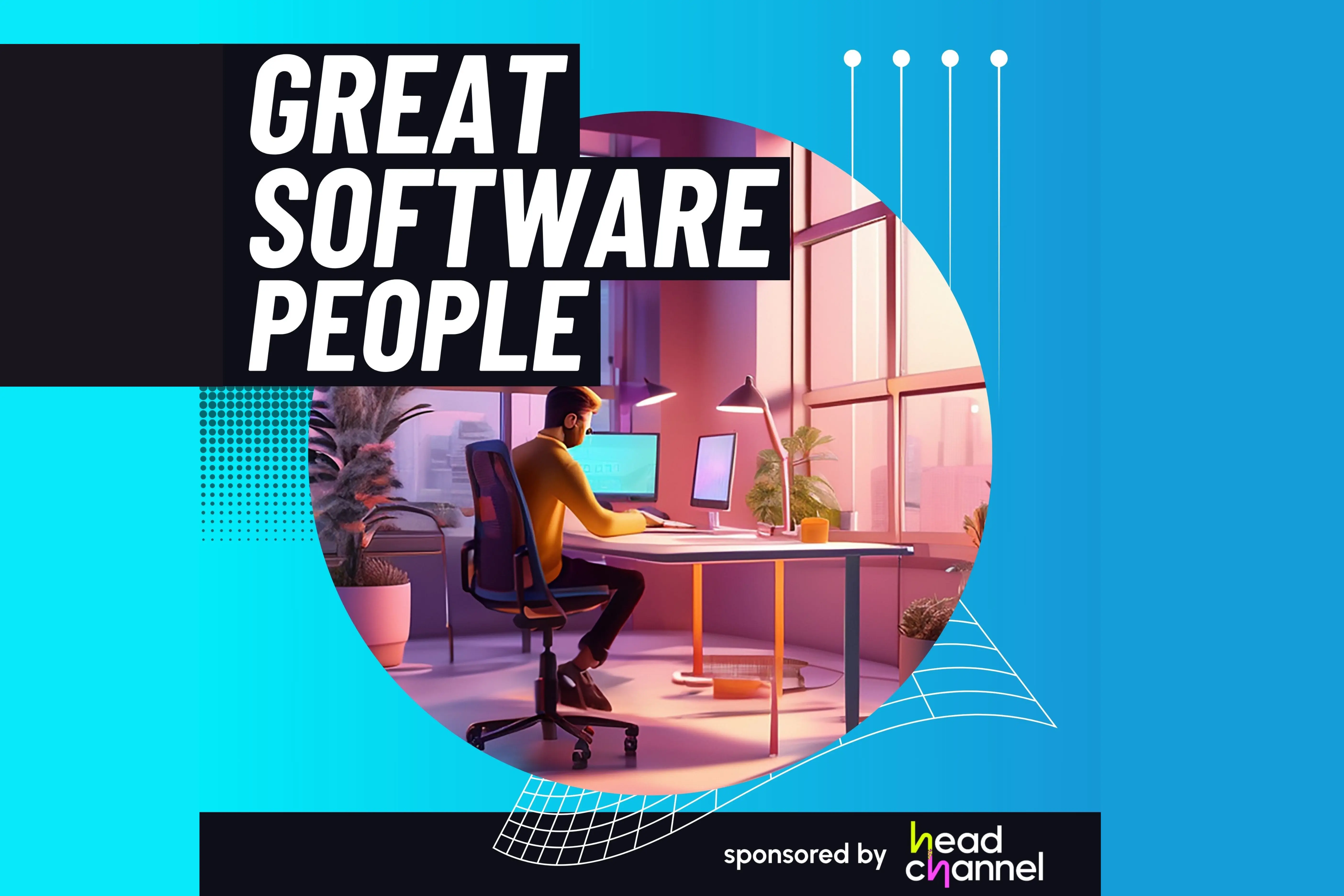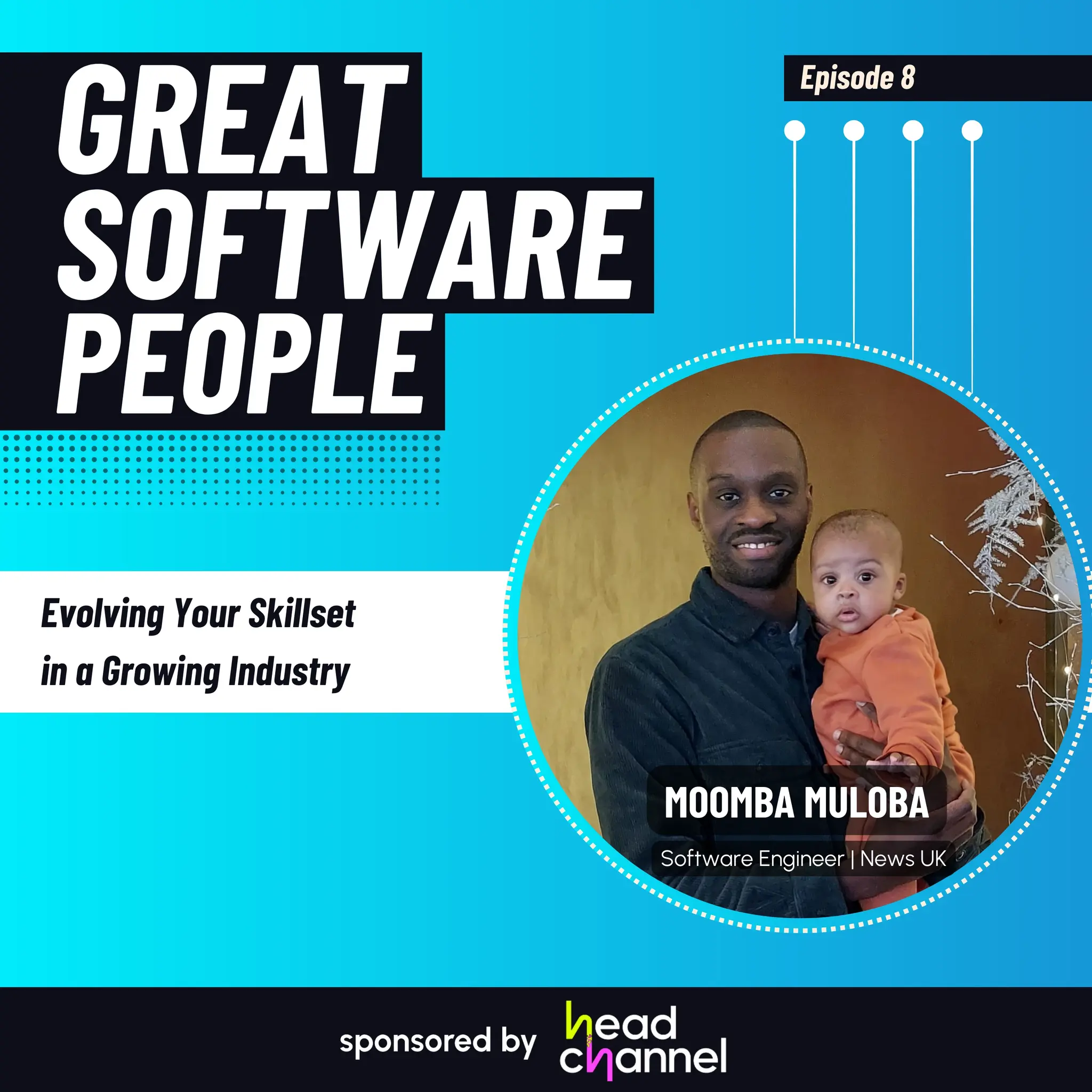
Evolving Your Skillset in a Growing Industry with News UK Software Engineer, Moomba Muloba - E8
Junior roles in software can take you to some exceptional places - since his start with us at Cohaesus, Moomba Muloba has launched a career that sees him making waves at News UK.
For those shifting through the early phases in their careers, this episode of Great Software People is packed with invaluable advice, and we learn how Moomba stays ahead of the curve in an ever changing industry.
This episode covers:
-
Moomba’s route through accountancy and sales before reaching his career in software
-
The importance of a portfolio in securing junior roles
-
Potential early career challenges of the shift towards home working
-
Upkeeping your knowledge with the industry’s latest developments

Episode highlights
“The world was slightly different back then - at the time there wasn’t too much beyond googling around and reading guides. You had to rely on documentation a lot more.” - 6:30 - Moomba Muloba
“I was an IT recruiter so I knew what a decent CV looked like, but I put a few decent apps together to help overcome any scepticism when I was applying.” - 9:00 - Moomba Muloba
“There’s always something to learn, and I think it helps with innovation really to have people close by, as long as it’s for a purpose.” - 14:25 - Moomba Muloba
“There aren’t many people who know the domain inside out, so when you find yourself as a domain expert, you’ve just got to figure it out.” - 21:00 - Moomba Muloba
LISTEN HERE:
[00:00:13]
Rich: Welcome to another episode of Great Software People. Today, I’m joined by Moomba Muloba. Moomba and I go back a few years—he joined Cohesus back in the day and has since built an impressive career. Hi, Moomba!
Moomba: Hey Rich, thanks for having me on the show.
Rich: Great to have you here. Let’s dive in. I always start with this: what did you want to do when you were growing up?
[00:00:51]
Moomba: Like a lot of people, I wasn’t sure what I wanted to do at 17 or 18. I initially registered to study Business and Computer Science at Brunel University. But midway through the course—after the first year—they switched it to Business and E-commerce.
Rich: Wait, they changed the course after the first year?
Moomba: Yeah, exactly. Everyone was doing the same modules in the first year, and then they decided to temporarily suspend Business and Computer Science. I didn’t sign up for E-commerce, so I switched to Business and Accounting instead. That decision eventually led me to spend a few years in finance, though I was always interested in computers.
[00:02:00]
Rich: So you originally wanted the computing part?
Moomba: Absolutely. I was interested in both business and computing, but I also had an interest in finance—my dad was an accountant. I made the switch to accounting on a bit of a whim, but it didn’t take me long to figure out I didn’t want to spend my life looking at balance sheets.
[00:02:40]
Rich: What was it about accounting that didn’t sit well with you?
Moomba: I just didn’t find it exciting. I tried working in the public and charity sectors as a freelancer, but my heart wasn’t in it. I realised it wasn’t what I wanted to do, but at that point, I still wasn’t sure what I did want to do.
Rich: Knowing what you don’t want is often the first step.
Moomba: Exactly. I moved into sales, thinking it might help me pivot into technology. I did a few small sales jobs and eventually ended up in recruitment.
[00:03:55]
Rich: So recruitment. How did that happen?
Moomba: I was interested in startups and technology but wasn’t sure where to start. I thought learning how to sell might be a good stepping stone. While working in recruitment, I spoke to a software engineer who had graduated from the same university as me. He was looking for a job, and as we talked, I thought, “If he’s doing it, why can’t I?” That conversation planted the seed.
Rich: It’s amazing how one conversation can change everything.
Moomba: Absolutely. At the time, I didn’t know anyone who was a software engineer. That was a turning point for me.
[00:04:52]
Rich: That was while you were at Adecco, right?
Moomba: Yes. I was a fully-fledged recruiter, making cold calls, meeting clients, and placing candidates. It was tough, but I wasn’t bad at it and learned a lot.
Rich: But something about software kept pulling you in?
Moomba: Definitely. I was one of those annoying people who would ask developers to build things for me, and when they’d say, “I’m not doing that for free,” I thought, “What if I could learn to build these things myself?”
[00:06:03]
Rich: So how did you get started?
Moomba: Back then, the resources weren’t what they are now. There weren’t many boot camps or online courses. I used Code Academy, but it wasn’t great. Most of my learning came from reading documentation, Googling, and experimenting. I’d go home after work, dive into tutorials, and try to build small projects.
Rich: That must have been a grind.
Moomba: It was, but I stuck with it for about a year and a half. By then, I had a small portfolio and started applying for jobs.
[00:07:15]
Rich: What’s the first project you were proud of?
Moomba: One was a simple Angular app that queried a movie database and displayed images and text. Another was a blog I built with Ruby on Rails. I remember demoing the blog to friends, and they didn’t get it. They were more impressed with the Angular app because it was more visual, even though it was simpler.
Rich: It’s funny how the effort you put into something doesn’t always match how it’s received.
Moomba: Exactly. Developers and non-technical people value different things.
[00:08:44]
Rich: You put together a portfolio, which is so important for juniors.
Moomba: Absolutely. I had an advantage because, as a recruiter, I knew what a good CV looked like. The portfolio helped overcome skepticism about why a recruiter was transitioning into software.
[00:10:20]
Rich: That led you to Cohesus, right?
Moomba: Yes, I remember getting a call from Priyanka. I was selective about where I applied, and Cohesus stood out as a place that wanted to help juniors grow their careers.
Rich: That was definitely the strategy at the time.
[00:11:27]
Rich: What were the main things you learned in your first software role?
Moomba: The biggest takeaway was the gap between self-teaching and working in a professional environment. Communication, problem-solving, and teamwork were on a whole different level. It was a steep learning curve, but invaluable.
[00:12:35]
Rich: What about working in the office? Do you think that’s important for juniors?
Moomba: Yes, especially at the start of your career. Being able to walk over and ask someone a question is invaluable. Even now, I think face-to-face collaboration drives innovation. But we have to adapt—many teams are distributed now.
[00:15:00]
Rich: After Cohesus, you moved to RealPage?
Moomba: That’s right. I joined a small company called PEC Software, which was acquired by RealPage. At RealPage, I got to focus on React, Redux, and Node.js, with an emphasis on product stability and unit testing. It was a great learning experience.
[00:19:12]
Rich: And now you’re at News UK.
Moomba: Yes, I’ve been at News UK for two years. I moved from front-end development to full-stack engineering. It’s a much larger organisation, so there’s a lot to learn. You can’t possibly know everything, but I’ve picked up a lot about discovery and problem-solving.
[00:24:52]
Rich: How do you stay up to date with tech?
Moomba: It’s mostly reactive—I learn what I need for the project I’m working on. If I wanted to go deeper, I’d build something on the side using similar technologies.
[00:25:35]
Rich: What’s your take on AI tools like ChatGPT?
Moomba: I’ve used ChatGPT occasionally. It’s useful for small tasks or learning, but it’s not a magic bullet. Experienced developers get more out of it because they know when it’s going off track.
[00:28:23]
Rich: Do you ever use your accounting degree in your software career?
Moomba: Not directly, but the skills I learned—like meeting deadlines and building networks—have been valuable.
[00:29:29]
Rich: Moomba, this has been a great conversation. Thank you so much for sharing your journey.
Moomba: Thanks for having me, Rich.

Contact us.
If you need a partner in software development, we're here to help you.
We will respond to your enquiry immediately.